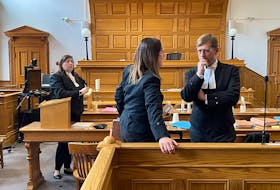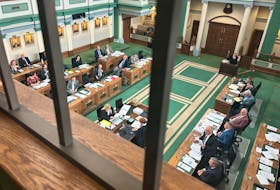ST. JOHN'S, N.L. — It won’t be the focus of his report, but at the Muskrat Falls Inquiry this week, Commissioner Richard LeBlanc was hearing about the regulation of provincial energy, energy policy and energy pricing.
Both in testimony and in new consultant reports entered into evidence, LeBlanc was told any future spending potentially affecting rates should be open to full, public review by an independent body like the Public Utilities Board (PUB).
Considering an additional transmission line to improve reliability? Full review.
Developing Gull Island with the help of money from provincial power bills? Full review.
“London Economics International does not believe that any expenditure that is included in rate base should be excluded from regulatory review,” stated a detailed report now in evidence.
The Muskrat Falls project was exempted by provincial legislation from a full review by the PUB. It was then put to the PUB in a limited, either/or case. The regulator reported conclusions could not be reached on a lower-cost option without more information. The project was sanctioned regardless at the end of 2012, with new legislation to lock ratepayers into covering the cost. While there was significant change to the outlook for construction before financial close at the end of 2013, no independent, public review was undertaken before close.
The London Economics report now with the inquiry covers much more ground on energy regulation in the province than just independent review of new projects. On Friday, A.J. Goulding finished taking questions on the details and related topics, having started his testimony Thursday.
LeBlanc now has access, for example, to a comparison of institutions (regulators, consumer representatives), laws and regulations in the different systems of Canadian provinces, with case studies on several key issues from Canada and the United States.
Goulding even spoke about the wording of least-cost power. He said legislation differs province to province on the exact language around what ratepayers should expect.
“Lowest possible cost without context always worries me because one of the things that needs to be taken into account is what level of reliability you’re looking for, so lowest possible cost in and of itself is often a bit overly simplistic,” he told John Hogan, lawyer for the consumer advocate.
“If I were writing legislation, I might have something that said lowest reasonable cost or something like that because lowest possible cost – over the short term, I can take the cost to close to zero, but over a sustained basis over the long run, I can’t do that.”
And when you’re reviewing proposed projects and spending that affects rates, he said, you need to account for the timeframe you’re talking about. As an example, think of the risk of allocating costs for Muskrat Falls over many decades. Is it more or less likely new technology would undercut the project in 10 years or 50 years?
If you’re comparing possible projects, do your wind turbines look the same in 10 years as they do in 50?
Apart from reviewing the merits of large projects for local ratepayers, the consultant noted other provinces are much further down the road when it comes to tackling issues associated with new and rapidly changing technologies, including improvements in energy storage, spot generation, electric-vehicle servicing and micro grids.
In Newfoundland and Labrador, Goulding advised, technology and consumer choice will be intertwined concerns.
“Rising rates will make self-generation more economic for more customers if they are allowed to do so; eventually these customers will seek to pool their resources, or suppliers will develop innovative ways to evade the restrictions on non-utility supply. N.L. will need to be proactive in addressing these challenges,” reads the report to LeBlanc.
LeBlanc has requested some additional response to the new reports from both the government and Nalcor Energy.
RELATED









